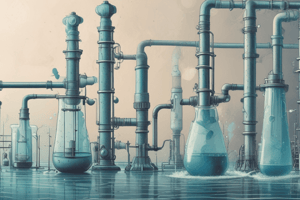Podcast
Questions and Answers
What causes hard water to prevent lathering with soap?
What causes hard water to prevent lathering with soap?
- Increased temperature of the water
- High levels of sodium in the water
- Presence of organic compounds
- Presence of dissolved salts of calcium and magnesium (correct)
What is produced when hard water is treated with soap?
What is produced when hard water is treated with soap?
- Lather
- Precipitate (correct)
- Foam
- Dissolved soap
Which soap is primarily responsible for the observed reactions with hard water?
Which soap is primarily responsible for the observed reactions with hard water?
- Potassium stearate
- Magnesium stearate
- Sodium stearate (correct)
- Calcium stearate
What happens to soap when it reacts with calcium ions in hard water?
What happens to soap when it reacts with calcium ions in hard water?
How is soft water characterized in relation to soap?
How is soft water characterized in relation to soap?
Which of the following ions is NOT typically associated with hard water?
Which of the following ions is NOT typically associated with hard water?
Flashcards are hidden until you start studying
Study Notes
Hard Water and Soap Lathering
- Hard water contains dissolved salts of calcium, magnesium, and other heavy metals, preventing soap from lathering.
- When soap (sodium or potassium salt of fatty acids like oleic, palmitic, or stearic) is added to hard water, it does not form lather but instead creates a white scum.
- The scum produced is due to the formation of insoluble soaps of calcium and magnesium.
Chemical Reactions
- Sodium stearate reacts with calcium chlorides, leading to the formation of calcium stearate, an insoluble compound:
- Reaction: 2C₁₇H₃₅COONa + CaCl₂ → (C₁₇H₃₅COO)₂Ca + 2NaCl
- A similar reaction occurs with magnesium sulfate, forming magnesium stearate, also an insoluble compound:
- Reaction: 2C₁₇H₃₅COONa + MgSO₄ → (C₁₇H₃₅COO)₂Mg + Na₂SO₄
Classification of Water
- Hard water is classified as water that does not readily form lather when mixed with soap, resulting in white curd formation.
- Soft water is characterized by its ability to lather easily with soap when shaken.
Studying That Suits You
Use AI to generate personalized quizzes and flashcards to suit your learning preferences.




